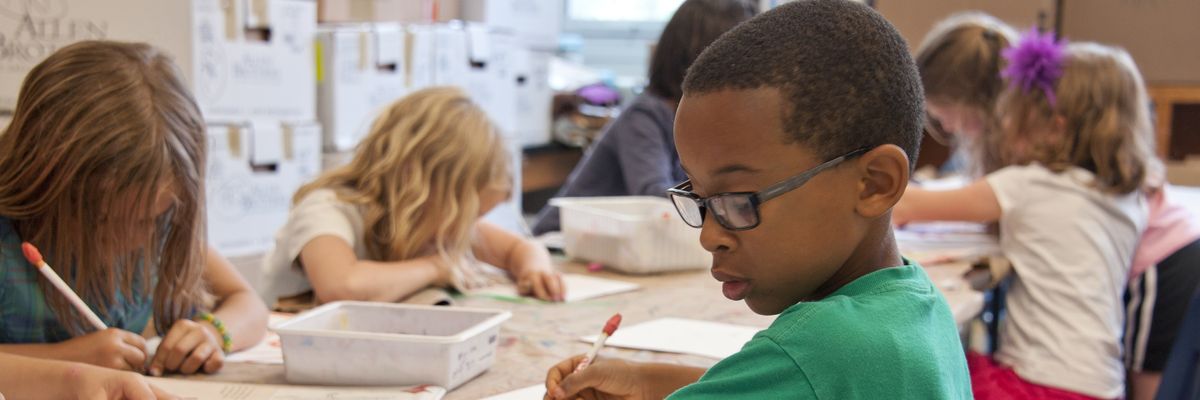Each morning at school, we hear the daily announcements over the intercom, followed by the recitation of the Pledge of Allegiance. It’s a familiar scene. The routine concludes with the collective and audible, "with liberty and justice for all," a civic promise that we strive to fulfill each day in public schools.
In the wake of the U.S. Capitol Insurrection on January 6, 2021, educators face mounting challenges to maintaining civic space, including a cadre of extremist legislators and, in New Hampshire at least, commissioners of education determined to advance their agendas of cynicism and fear.
As a sixth grade teacher, I know that fear impedes learning and leads students to shut down. That’s why supporting students with care is so important in a classroom that values exploring viewpoints in a respectful manner. In fact, this ethic of care and personal concern is core to civic education. It’s in formal lessons, but also embedded within the day-to-day interactions in a public school. Students who feel cared for and respected are more likely to be curious about their peers, and less likely to feel threatened by difference. Natural conversations flow from earnest curiosity, and stronger relationships are the result. The United States stands to lose this as funding is drained away from public schools by expanding voucher programs.
These destructive politicians see the great potential of our public schools—the last best hope of an inclusive multiracial, multiethnic democracy—and have made a calculated decision to create chaos, promote vouchers for the rich, and destabilize communities.
In 2021, reactionaries coalesced to ban the teaching of honest history in states like New Hampshire and Oklahoma with legislation that intimidates teachers with the threat of revoking professional credentials. They paired restrictions on teaching with an expansive privatization push in the form of vouchers. Both of these acts are currently being challenged in the courts. Yet they formed a powerful one-two punch of restricting intellectual freedoms for public school students while sending money to private and religious schools. This was a hard-hitting blow to the reputation of the historically independent "live free or die" state.
Unimpeded by a sense of pride in our legacy of quality public schools, reckless officeholders abandoned tradition for the new national trend of smashing public schools and neglecting their public responsibility. These destructive politicians see the great potential of our public schools—the last best hope of an inclusive multiracial, multiethnic democracy—and have made a calculated decision to create chaos, promote vouchers for the rich, and destabilize communities.
In the most recent legislative session, New Hampshire’s House Committee on Education continued their ruinous path toward the fringe. One bill proposed granting the commissioner of education the ability to subpoena teachers. This would place an unprecedented amount of power in the hands of a single appointee bent on dismantling public education. The commissioner has also sought to ban books by subverting established institutional guidelines and replacing them with a shell game designed to tie local officials in knots and take books off shelves.
New Hampshire joins a growing list of states that are limiting school and classroom libraries, like Florida and Texas. These book bans target children’s literature featuring Black and LGBTQ+ characters and narratives. For a time, districts in Florida even removed picture books about hall of fame baseball players Roberto Clemente and Hank Aaron to comply with new laws. The state went further by threatening to punish educators who violate book bans with felony charges and jail time, a measure that some lawmakers in my own state appear to endorse with their own censorious bill. The suggested penalty in New Hampshire for violating proposed book bans is up to seven years in prison.
As these proposed laws moved forward, New Hampshire lawmakers simultaneously sought to expand vouchers for the wealthy. Despite bipartisan opposition, the state house of representatives voted to approve raising the income eligibility for vouchers. Another voucher proposal seeks to eliminate all income limits, allowing millionaires to receive a public subsidy to attend private school. These efforts are a dereliction of fiduciary responsibility—a reverse Robin Hood scheme that would leave the most financially precarious schools and communities to make do with less.
This country doesn’t have to be governed by fear. Our public school students don’t have to lose what limited funding they have to vouchers. We can start turning things around by treating educators with respect, not bullying them with misguided legislation intended to steal away rights, time, and resources from our students.
If teachers are to be nation-builders, then states and communities must be school-builders. We do this by investing in physical school buildings, but also by providing children with the food and care they need to do their best each day and ensuring fair wages for educators.
It’s past time that we demand more from leaders, who should be raising pay for educational professionals, not raising penalties for reading children’s books. This includes a guarantee that each student is getting the food they need to function and learn, a key part of ensuring an honest education for all, not just for those who can afford it.
Diverting public money away from public schools is not in the interest of our students or the health of our democracy. A positive agenda that is responsive to the long-term interests of our communities is what we need now—and that means prioritizing our public schools.

